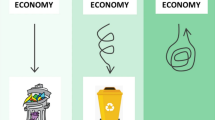Abstract
Concern about the environment and sustainable growth has raised questions related to resource availability and limits regarding the ability of the planet to provide everyone with an improved material standard of living. Such concerns lead to charges that the industrialized world, particularly the United states, is living beyond its means and taking more than its share of resources to produce a life style that is not sustainable. Whether overconsumption is a legitimate problem and changing patterns of consumption are necessary are questions that need discussion. The Protestant Ethic provided moral limits on consumption during the early stages of industrialization in Western Europe and the United States. This ethic weakened during the development of a consumer society, prompting speculation that a new environmental ethic is needed to perform the same function in modern society.
Similar content being viewed by others
References
Bell, D.: 1976, The Cultural Contradictions of Capitalism (Basic Books, New York).
Clark, W. C.: 1989, ‘Managing Planet Earth’, Scientific American 261(3), 39–56.
Ditz, G. W.: 1980, ‘The Protestant Ethic and the Market Economy’, Kyklos 33(4), 623–642.
Durning, A.: 1992, How Much Is Enough? (W. W. Norton, New York).
Galbraith, J. K.: 1967, The New Industrial State (Houghton Mifflin, Boston).
Gooding, J.: 1972, The Job Revolution(Walker & Co., New York).
Kluckhohn, C.: 1958, ‘Have There Been Discernible Shifts in American Values During the Past Generation’, in Elting E. Morrison (ed.), The American Style: Essays in Value and Performance (Harper & Bros., New York), pp. 201–224.
LaPiere, R.: 1959, The Freudian Ethic(Duell Sloan, and Pearce, New York).
Lasch, C.: 1978, The Culture of Narcissism: American Life in an Age of Diminishing Expectations(Norton, New York).
Meadows, D. H. et al.: 1972, The Limits to Growth: A Report for the Club of Rome's Project on the Predicament of Mankind(Universe Books, New York).
Mesarovic, M. D.: 1974, Mankind at the Turning Point: The Second Report to the Club of Rome(Dutton, New York).
McClelland, D. C.: 1961, The Achieving Society(The Free Press, New York).
Niebuhr, R.: 1944, The Children of Light and the Children of Darkness(Charles Scribner's Sons, New York).
Perry, R. B.: 1994, Puritanism and Democracy(The Vanguard Press, New York).
Sheppard, H. L. and N. Q. Herrick: 1972, Where Have All the Robots Gone(The Free Press, New York).
Special Task Force to the Secretary of Health, Education, and Welfare: 1973, Work in America (MIT Press, Cambridge).
Weber, M.: 1958, The Protestant Ethic and the Spirit of Capitalism(Charles Scribner's Sons, New York).
Yankelovich, D.: 1981, New Rules: The Search for Self-Fulfillment in a World Turned Upside Down(Random House, New York).
Rights and permissions
About this article
Cite this article
Buchholz, R.A. The Ethics of Consumption Activities: A Future Paradigm?. Journal of Business Ethics 17, 871–882 (1998). https://doi.org/10.1023/A:1005753003896
Issue Date:
DOI: https://doi.org/10.1023/A:1005753003896




